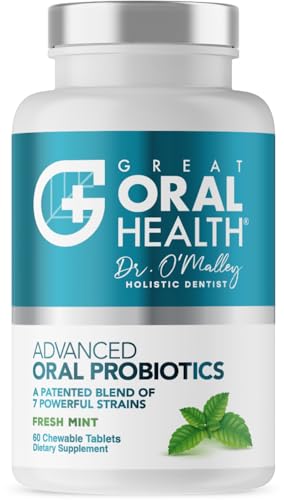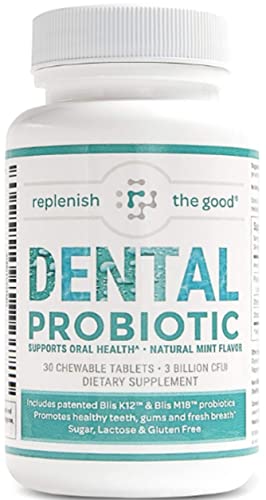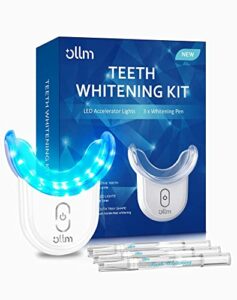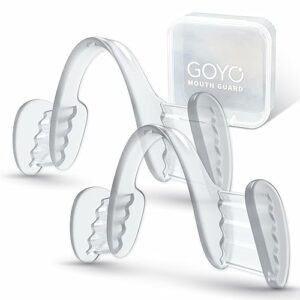Have you ever wondered how to maintain a healthy smile and protect your teeth from decay? We’ve been there too, struggling to find the best solutions for our dental health. That’s why we’re here to share some valuable insights with you. In this blog post, we will be delving into the world of dental probiotics and exploring how they can work wonders for your oral hygiene. We understand the importance of having a radiant smile and the desire to keep our teeth strong and healthy. So, let’s embark on this journey together and discover the power of dental probiotics in maintaining optimal oral health.
Revolutionize Your Dental Health with Top-Selling Dental Probiotics
What are Dental Probiotics?
When we think of probiotics, our minds often go straight to gut health. However, did you know that probiotics can also play a significant role in maintaining a healthy mouth? Dental probiotics are a growing trend in oral care, and they offer a natural and effective way to promote oral health.
Understanding Dental Probiotics
Dental probiotics are beneficial bacteria that are specifically designed to support oral health. These probiotics work by restoring the natural balance of bacteria in the mouth, which can become disrupted due to various factors such as poor oral hygiene, diet, medications, or stress.
How do Dental Probiotics Work?
Dental probiotics work in several ways to promote oral health:
- Restoring Balance: These probiotics help to restore a healthy balance of bacteria in the mouth, preventing the overgrowth of harmful bacteria that can lead to dental issues.
- Fighting Bad Breath: By reducing the levels of odor-causing bacteria, dental probiotics can help combat bad breath, leaving you with a fresh and clean mouth.
- Supporting Gum Health: Dental probiotics have been shown to support gum health by reducing inflammation and promoting the growth of beneficial bacteria that can help protect against gum disease.
- Preventing Cavities: Some strains of dental probiotics produce antimicrobial substances that can help inhibit the growth of cavity-causing bacteria, reducing the risk of tooth decay.
Benefits of Dental Probiotics
Incorporating dental probiotics into your oral care routine can offer a range of benefits, including:
- Natural and Safe: Dental probiotics provide a natural and safe alternative to chemical-based oral care products.
- Improved Oral Health: By restoring the balance of bacteria in the mouth, dental probiotics can help prevent issues such as cavities, gum disease, and bad breath.
- Reduced Antibiotic Use: For those prone to oral infections, dental probiotics may help reduce the need for antibiotic treatment by supporting the body’s natural defense mechanisms.
- Suitable for All Ages: Dental probiotics are suitable for individuals of all ages, from young children to seniors, and can be beneficial for those with sensitive teeth or gums.
How to Use Dental Probiotics
Using dental probiotics is simple and can be easily incorporated into your existing oral care routine. Here are a few tips:
- Choose the Right Product: Look for dental probiotics that contain specific strains of beneficial bacteria, such as Lactobacillus reuteri or Streptococcus salivarius.
- Follow the Instructions: Read and follow the instructions provided by the manufacturer for optimal results.
- Use as Directed: Typically, dental probiotics come in the form of lozenges, gums, or mouth rinses. Use them as directed, usually after brushing your teeth or as recommended by your dentist.
How do Dental Probiotics Work?
Maintaining good oral health is essential for a healthy smile and overall well-being. While regular brushing, flossing, and dental check-ups are crucial, incorporating dental probiotics into your oral care routine can provide additional benefits. In this section, we will delve into the mechanisms of action of dental probiotics and explain how they work to promote oral health.
to Dental Probiotics
Before we dive into the details, let’s briefly understand what dental probiotics are. Dental probiotics are beneficial bacteria that can be ingested or applied topically to the teeth and gums. These “friendly” bacteria help to restore the natural balance of oral microflora, which can be disturbed by factors such as poor oral hygiene, diet, or the use of certain medications.
Restoring the Microbial Balance
One of the primary ways dental probiotics work is by restoring the microbial balance in the oral cavity. The mouth is home to a diverse community of bacteria, some of which are beneficial, while others can cause oral health issues such as tooth decay and gum disease. Dental probiotics introduce beneficial bacteria that compete with harmful bacteria, creating an environment that is unfavorable for the growth of pathogens.
Inhibition of Harmful Bacteria
Dental probiotics can produce antimicrobial substances that inhibit the growth of harmful bacteria. These substances can include organic acids, hydrogen peroxide, and bacteriocins, which serve as natural defense mechanisms against pathogens. By inhibiting the growth of harmful bacteria, dental probiotics help to prevent oral infections and maintain a healthy oral environment.
Strengthening the Tooth Enamel
Tooth enamel is the outer layer of the teeth and serves as a protective barrier. Dental probiotics can aid in strengthening the tooth enamel by promoting remineralization. Remineralization is the process by which minerals such as calcium and phosphate are deposited back into the enamel, repairing and strengthening it. This can help to prevent tooth decay and tooth sensitivity.
Reduction of Bad Breath
Bad breath, also known as halitosis, can be embarrassing and a sign of an unhealthy oral environment. Dental probiotics can help combat bad breath by neutralizing the compounds produced by harmful bacteria that contribute to unpleasant odors. With the regular use of dental probiotics, you can enjoy fresher breath and increased confidence.
Supporting Gum Health
Healthy gums are crucial for maintaining oral health. Dental probiotics can play a role in supporting gum health by reducing inflammation and promoting tissue healing. Additionally, probiotics can help to balance the oral microbiome, which is beneficial for preventing gum disease and gum recession.
Key Benefits of Dental Probiotics
To summarize the benefits of dental probiotics, we have compiled a list of key points:
- Restores the natural balance of oral microflora
- Inhibits the growth of harmful bacteria
- Strengthens tooth enamel through remineralization
- Reduces bad breath by neutralizing odor-causing compounds
- Supports gum health by reducing inflammation and promoting tissue healing
It is important to note that dental probiotics are not a substitute for regular oral hygiene practices. They should be used in conjunction with brushing, flossing, and regular dental check-ups.
In conclusion, dental probiotics work by restoring the microbial balance, inhibiting harmful bacteria, strengthening tooth enamel, reducing bad breath, and supporting gum health. By incorporating dental probiotics into your oral care routine, you can take a proactive step towards improving your oral health and enjoying a brighter, healthier smile.
Benefits of Dental Probiotics
Maintaining good oral health is crucial for overall well-being. While brushing and flossing are essential, incorporating dental probiotics into your oral care routine can provide additional benefits. Dental probiotics are beneficial bacteria that can help restore and maintain a healthy balance in your mouth. In this section, we will explore the potential benefits of using dental probiotics, such as preventing tooth decay, reducing bad breath, and promoting a healthy oral microbiome.
Preventing Tooth Decay
Tooth decay, also known as dental caries, is a common oral health issue caused by harmful bacteria in the mouth. Dental probiotics offer several ways to help prevent tooth decay:
- Biofilm Disruption: Dental probiotics can disrupt the formation of harmful biofilms on the teeth, which are a breeding ground for bacteria that cause cavities.
- Production of Beneficial Substances: Some dental probiotics produce substances like hydrogen peroxide and antimicrobial peptides that inhibit the growth of cavity-causing bacteria.
- pH Regulation: By regulating the pH levels in the mouth, dental probiotics can create an environment less favorable for acid-producing bacteria, reducing the risk of tooth decay.
Reducing Bad Breath
Bad breath, or halitosis, can be embarrassing and impact your self-confidence. Dental probiotics can help combat bad breath in the following ways:
- Elimination of Odor-Causing Bacteria: Dental probiotics can displace and eliminate bacteria that produce foul-smelling compounds, addressing the root cause of bad breath.
- Neutralization of Odors: Some dental probiotics produce enzymes that break down volatile sulfur compounds responsible for bad breath, neutralizing the odor.
Promoting a Healthy Oral Microbiome
The oral microbiome refers to the diverse ecosystem of microorganisms that inhabit the mouth. Maintaining a healthy oral microbiome is essential for oral health. Dental probiotics offer the following benefits for a balanced oral microbiome:
- Competition with Harmful Bacteria: Dental probiotics can compete with harmful bacteria for space and nutrients, reducing their presence in the mouth.
- Supporting Beneficial Bacteria: Some dental probiotics stimulate the growth of beneficial bacteria, promoting a healthy balance in the oral microbiome.
- Modulation of the Immune System: Dental probiotics can help modulate the immune response in the mouth, promoting a balanced and appropriate reaction to oral pathogens.
Choosing the Right Dental Probiotic
When selecting a dental probiotic, there are several factors to consider. Look for products that:
- Contain Strains with Proven Benefits: Check for specific strains of bacteria that have been studied and shown to provide dental benefits.
- Have High Viability: Ensure that the probiotic bacteria are viable and survive storage, transportation, and oral consumption.
- Are Free from Unwanted Ingredients: Avoid dental probiotics that contain artificial sweeteners, colors, or unnecessary fillers.
- Come from Reputable Brands: Choose dental probiotics from reputable brands that prioritize quality and efficacy.
Incorporating dental probiotics into your oral care routine can be a valuable addition to maintaining good oral health. Consult with your dentist or healthcare professional to determine the best dental probiotic for your specific needs.
Remember, dental probiotics are not a substitute for regular brushing, flossing, and professional dental care. They should be used as a complementary measure to support oral health and promote a healthy oral microbiome.
Choosing the Right Dental Probiotic
When it comes to oral health, we often think of brushing, flossing, and regular dental check-ups. But did you know that maintaining a healthy balance of bacteria in your mouth is also crucial for good oral hygiene? This is where dental probiotics come into play. Dental probiotics are specifically designed to promote a healthy oral microbiome, which can help prevent dental issues such as cavities, gum disease, and bad breath. However, with so many options available on the market, how do you choose the right dental probiotic for yourself? Let’s explore some factors to consider:
Strain Specificity
Not all probiotic strains are created equal, and this holds true for dental probiotics as well. Look for dental probiotics that contain strains known to have oral health benefits, such as Streptococcus salivarius K12 and K18. These strains have been shown to inhibit the growth of harmful bacteria, reduce plaque formation, and promote fresher breath. Additionally, Lactobacillus reuteri has also shown promising results in promoting oral health.
Dosage
The dosage of dental probiotics is an important factor to consider. A higher dosage does not necessarily mean better results. In fact, some studies have found that lower doses of certain probiotic strains can be just as effective as higher doses. It’s important to follow the recommended dosage instructions provided by the manufacturer or consult with your dentist or healthcare professional to determine the appropriate dosage for your specific needs.
Product Quality
When it comes to choosing any supplement, including dental probiotics, product quality is paramount. Here are some key points to consider when evaluating the quality of a dental probiotic:
- Source: Look for dental probiotics that are sourced from reputable manufacturers who adhere to good manufacturing practices (GMP) and have a track record of producing high-quality supplements.
- Strain Viability: Ensure that the dental probiotic contains live and viable strains of bacteria. Look for products that are stored and shipped in a way that preserves the viability of the bacteria.
- Third-Party Testing: Opt for dental probiotics that have undergone third-party testing to ensure the accuracy of the label claims and the absence of harmful contaminants.
- Product Formulation: Consider the form in which the dental probiotic is available. Some may prefer capsules, while others may prefer lozenges or chewable tablets. Choose a form that is convenient and easy for you to incorporate into your daily routine.
Comparison Table: Dental Probiotic Options
| Dental Probiotic | Strain Specificity | Dosage | Product Quality |
|---|---|---|---|
| Probiotic Brand A | – Streptococcus salivarius K12 and K18 | Recommended | – Sourced from reputable manufacturer |
| – Lactobacillus reuteri | dosage provided | – Strain viability ensured | |
| – Third-party tested for label claims and purity | |||
| – Available in convenient capsule form | |||
| Probiotic Brand B | – Streptococcus salivarius K12 and K18 | Lower dosage | – Sourced from reputable manufacturer |
| – Lactobacillus reuteri | recommended | – Strain viability ensured | |
| – Third-party tested for label claims and purity | |||
| – Available in tasty chewable tablet form | |||
| Probiotic Brand C | – Streptococcus salivarius K12 and K18 | Higher dosage | – Sourced from reputable manufacturer |
| – Lactobacillus reuteri | dosage provided | – Strain viability ensured | |
| – Third-party tested for label claims and purity | |||
| – Available in refreshing lozenge form |
Remember, choosing the right dental probiotic is a personal decision. It’s important to consider your specific oral health needs, consult with your dentist or healthcare professional, and conduct your own research to find the dental probiotic that best suits you. With regular use and good oral hygiene practices, a dental probiotic can be a valuable addition to your oral health routine.
Final thoughts on the effectiveness and benefits of dental probiotics
In conclusion, dental probiotics are a promising solution for maintaining oral health by balancing the bacteria in our mouths. Throughout this post, we have discussed how these probiotics work by introducing beneficial bacteria that can outcompete harmful ones, thus reducing the risk of dental issues such as cavities and bad breath. However, it is important to consider factors such as the specific strains of bacteria used, the quality of the product, and individual oral health needs before incorporating dental probiotics into our routine. We recommend consulting with a dental professional to determine if dental probiotics are a suitable option for you. Remember, a healthy smile begins with a balanced oral microbiome.


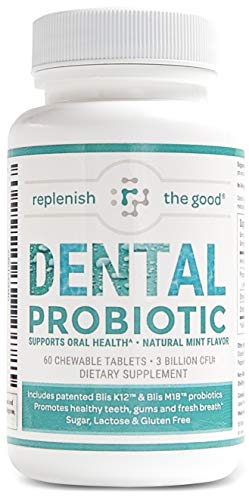

![What are Dental Probiotics and How Do They Work? 3 NatureWise Oral Health Chewable Probiotics | Supports Healthy Teeth, Gums, & Better Breath | Ear, Nose, Throat Immunity for Kids & Adults | Sugar-Free Natural Mint Flavor [2 Month Supply - 50 Tablets]](https://m.media-amazon.com/images/I/41vQGzhKsFL.jpg)
